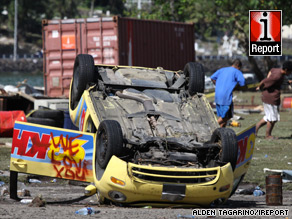THE grand finale of the 2008 Edition of the Nigerian National Media Merit Awards (NNMA) penultimate weekend may have come and gone, but it has left some historical imprints on the commercial city of Kano. The reason being that it is only the first time it was holding there or any state capital in the North West, it also witnessed two additional prizes instituted for competition.
Besides, the event witnessed the largest gathering of media practitioners, who competed for laurels and over 200 journalists went away with medals. This much was attested to by Prince Tony Momoh, former Information and Culture Minister, who is also Chairman of the Award Nominating Panel of the NMMA. In all, Momoh said there were a total of 44 winners selected from the different categories of media works.
His panel, he revealed, received 610 entries from 442 entrants, as against last year's 753 entries from 539 applicants. A breakdown of the figures showed that 32 prizes were contested by practitioners from the print media, six prizes were won by the radio and seven were won by television journalists from different media in the country. Altogether, 64 prizes were won by over 200 winners at the yearly largest gathering of media practitioners.
Of the figure, 391 entries were received from the print media, as against 532 that were received from 555 entrants last year. He lamented, however that the entrants were largely in favour of Lagos area probably because of the heavy media presence there and used the opportunity to plead for more entries from journalists outside Lagos.
The choice of Kano, Momoh stressed, was partly informed by a deliberate attempt to mobilize journalists from all the segments of the country to identify with and compete with others with the hope of winning laurels that would improve their professional standings, knowing that winners represented the very best of the core of the professionals in the country.
He disclosed that the winners were carefully selected so as to keep to the tradition of the awards which started almost 18 years ago, noting that, the tradition would be maintained as long as practitioners identified with the awards.
Momoh's views struck a cord with that of Malam Garba Shehu, media consultant to the former Vice President, and a director of newly established Abuja-based Peoples Daily Newspapers, who also bemoaned the low level of participation in the awards by journalists from the north.
He hoped, in a chat with The Guardian at the Government House that the hosting of the event at Kano would spur media practitioners from the northern part of the country, especially from Kano to start making their relevance felt in the industry by competing favorably with their counterparts from other parts of the country for laurels.
Publisher of the defunct Nigerian Economist, Dr. Haroun Abdulrasheed Adamu, himself an indigene of Kano traced the history of media practice in the north and submitted that Kano pioneered private newspapers in the north, while Zaria pioneered the publication of government-owned newspaper, as reflected in Gaskiya Tafikwabo.
The host governor, Ibrahim Shakarau said the decision to bring the hosting of the event for this year to Kano was a wise one that would impact positively on the national character and image of the NMMA and would also facilitate the attainment of its objectives.
According to the governor, who was represented by his deputy, Abdullahi Tijani Mohammed Gwarzo, "the rotation of the awards night from one state capital to another is certainly a more ideal way of providing a forum whereby Nigeria media merit awards laureates, who are some of the most eminent media personalities with tremendous skills and first minds can come together. It will also give the members the opportunity to go round the whole federation, thereby familiarizing them with the problems of this country as well as achievements recorded by the states in various fields of human endeavour."
But he used the opportunity to appeal to policy makers in the industry to critically look at the areas that are deficient in the media practice in the country, the important role of the media as the link between government and the people. According to him, it was a common knowledge these days for media practitioners to write baseless and unfounded reports on individuals with a view to smearing the image of the personalities and bring them down politically.
"It is in the light of this unfortunate attitude among journalists, the Board of Trustees of the NMMA should not only reward media excellence among practitioners, but device means of penalizing erring media practitioners who indulge in false reporting and other unethical practices, because it is this ugly trend among journalists that is scaring away some legislators at the National Assembly from the quick passage of the freedom of information bill (FOIB)".
He added that while Nigerians supported the FOI Bill, because of its potentials for enhancing checks and balances in governance, "we need to say that journalists need to do more to convince the Nigerian public and the country's lawmakers that the bill would not be abused."
While admitted certain lapses in the practice of journalism in the country, he, however, said very little could be done to punish erring journalist unless the Press Council is given enough teeth to bite. To that he said all the stakeholders, including the Nigeria Union of Journalists (NUJ); the Nigerian Guild of Editor (NGE) as well as the Newspaper Proprietors should all join hands together to ensure the objective of sanitizing the profession is achieved.
Information and Communication Minister, John Odey, in his remark thanked the Board of Trustees of the NMMA for having been able to sustain the awards, which spanned over 16 years, in-spite of all odds. For him, "it takes an excellent mind to recognize excellence and expressed happiness for them for forging a healthy competitive spirit among media practitioners.
Represented by the Acting Director-General of the Federal Radio Corporation of Nigeria (FRCN), Mrs. Maria Ode, the minister expressed the determination of the government to support the body in everything possible, and lauded the Kano government for agreeing to host the programme.
One feature of the Kano outing was that the awards had increased by two as Shekarau, a former teacher, endowed a Prize for Education Reporter of the year with effect from next year, while Chevron Company also endowed a prize for Oil and Gas Reporter of the year. While the governor placed the sum of N5 million for his Prize, Chevron prize for Oil and Gas was N2 million.
Founder of the African Refugees Foundation (AREF) and former Nigerian Ambassador to Ethiopia, Chief Olusegun Olusola, who stood in for the Chairman of the Board of Trustees of the NMMA, Alhaji Alade Odunewu, reminded the gathering that next year's awards ceremony scheduled for Enugu would coincide with the 50th anniversary of the establishment of television in the country.
He, therefore, solicited the cooperation of the governors towards making the event more successful, given its historical importance as the event marking the establishment of that genre of media would be marked in a grand style. The Late doyen of Nigerian journalism, Dr. Ismail Babatunde Jose was also remembered at the occasion.
Olukayode Thomas and Ronke Olawale were among the reporters that won awards at the occasion. While Thomas won the Bashorun MKO Abiola Prize for Sports Reporter of the year, Olawale won the Ernest Sisei Ikoli Prize for Newspaper Reporter of the year.
Other categories of awards that were competed for included the Abubakar Imam prize for Newspaper Features Writer of the year which was won by Adeboboye Tope of the Daily Sun Newspaper, while Omokaro Thomas Arikawo of National Standard won the Olu Aboderin Prize for Entertainment Reporter of the year.
The Buba Marwa Prize for the Defence Reporter of the year went to Olu Ojewale, an Associate Editor with Tell Magazine, who also won the Gani Fawehinmi Prize for Human Rights Reporter of the year; Gbadamosi Kehinde of Vanguard Newspaper won the News Photographer of the year award and Adeniyi Kolawole of Broad Street Journal (BSJ) clinched the UBA prize for Money Market Reporter of the year.
Igbalade Oluwaseun of IT & Telecom Digest won the MTN Prize for Telecommunications Reporter of the year; Babatunde Jimoh of Vanguard Newspaper won the Bukola Saraki prize for Agriculture Reporter of the year, while Taofeeq Kunle Yusuf of Tell Magazine won the Oyinlola Prize for Culture and Tradition Reporter of the year.
Philip Akinsuton of Tourism Digest won the Ahmadu Adamu Mu'azu Prize for Travel and Tourism reporter of the year, Tony Manuaka, a Senior Associate Editor of BSJ won both the Intercontinental Bank Prize for Capital Market Reporter of the year as well as the Union Bank Prize for the Banking and Finance Reporter of the year; Ajero Chidi Chris, an Associate Editor with Newswatch Magazine clinched the Lateef Jakande Prize for Political Reporter of the year, while Kelechi Obasi of BSJ won The Guardian Newspapers Prize for Investigative Reporter of the year.
Emmanuel Maya of Sunday Sun Newspaper won the NAFCON Prize for Environmental Reporter of the year; Sam Omatseye, the Chairman of Editorial Board of The Nation Newspapers clinched the Alade Odunewu prize for Columnist of the year, while the IGI Prize of Insurance Reporter of the year went to Sola Alabadan of Daily Independent.
Also, the Nnamdi Azikiwe Prize for cartoonist of the year went to Moses Olorunleke; the Beatrice Bassey Ita Prize for Female Reporter of the year went to Stella Sawyer of Tell Magazine; the Cecil King Prize for Print Journalist of the year was clinched by John Ogunro Julius of National Standard. The Sunny Odogwu Prize for Business Reporter of the year went to Anayochukwu Agbo of Tell Magazine, while the Conoil prize for Energy Reporter of the year went to Salif Alhassan Atojoko, an Associate Editor with the BSJ.
Muyiwa Lukas, a Senior Writer with the BSJ clinched the BAT industry Reporter of the year Prize; Iwuori John of THISDAY Newspaper won the NPA Prize for Maritime Reporter of the year; Nigerian Tribune picked the Prize for the Editorial of the year; Patience Bukola Afolabi of The Week Magazine won the Peter Odili Prize for Power Reporter of the year, while Andy George Umunenze of The Source Magazine won the Aviation Industry Reporter of the year.
The Babatunde Jose Prize for Newspaper of the year went to the Daily Independent, whose editor, Mr. Ikechukwu Amaechi also won the Dele Giwa Prize for the Editor of the year. The WAMCO Prize for the Newsmagazine of the year went to Tell Magazine.
In the electronic category (radio), Aigbe Hilda of the Voice of Nigeria (VON) picked the Radio Presenter of the year award; Funke Treasure Durodola of the Federal Radio Corporation of Nigeria (FRCN) emerged the winner of the Radio Production of the year award; Kareem Temitayo Abolanle of the Gateway Radio Ogun State picked the Prize for the Radio Programme of the year and Raypower Radio emerged the NBC's Radio Station of the year.
In the television category, the Cadbury Prize for TV Reporter of the year went to Deji Badmus of Channels Television; Babajide Maurufonu, an Independent Producer won the Television Production of the year prize; Shiju Alabi of MBI Television won the Television Newscaster of the year; the Television Programme Presenter of the year went to Derinola Osiname of Channels Television, while the Nigerian Television Authority (NTA), Network News won the Television Station of the year
From Mohammed Abubakar, Kano

![]() See iReporter images of the aftermath »
See iReporter images of the aftermath »![]() See a map of the affected region »
See a map of the affected region »![]() See an explainer on tsunamis »
See an explainer on tsunamis »![]() Listen to Laumoli speak about the impact of the quake and tsunami »
Listen to Laumoli speak about the impact of the quake and tsunami »



